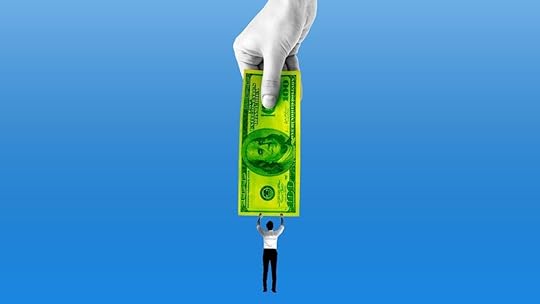Economyth – pseudo-facts disguise as an economic theory, fundamentals, and models – Book Review
 Economyth – pseudo-facts disguise as an economic theory, fundamentals, and models.
Economyth – pseudo-facts disguise as an economic theory, fundamentals, and models.The
book opens with a foreword and preface of the new version which basically gave
a summary of what had happen since the first publication in term of reception.
The work was cherished by heterodox economist and sparked debate over the way
of economics was taught as a subject. This was in light of the economic crash
in 2008-09, which was not predicted by many ‘experts’.
The
idea however was rejected by mainstream neo-classical economist due to the fact
that it challenges the established theory.
David
Orrell blamed the abused of mathematical models, used by bankers, analyst, and
economist, not just the models cannot predict the crash, he argued that the
model helped cause the crash. But he went further, not just the mathematical
models were flawed, the fundamental theory in which we understand economy is
plain wrong.
Orrell
maintained that whilst economist based their economic law from reductionist
model of Newtonian physics, humans are not like atoms, they are not rational
and cannot be modelled. He is not alone on this, Ha Joon-Chang also maintains
in his book that economics is not a science like physics.
But
while Chang criticized free-market economics, Orrell went further and dispelled
the fundamental ‘law’ of economics – the supply and demand theory. He insisted
that the supply and demand curve, which was taught in every economic school,
has never been proven empirically with real data, the curve is “like a unicorn,
always drawn but never really seen”.
The problem with the curve is that it exists on ceteris paribus – other things held constant, but in real life, this was never the case, supply and demand always change and dance together. The danger of perceiving the concept as ‘law’ will have a severe consequence in real life, we will be searching (wasting our time) for a creature that is non-existent.
Orrell
then pointed his gun to the ‘efficient market’ hypothesis which assume that
people are rational motivate by profit, have access to market data, and
independent in making decisions. This theory take root from atomic theory which
equate individuals like a particle of atoms. He lamented that this is
fundamentally wrong as human always did irrational things and they communicate,
advocate, and influence others, to create a mathematical model out of
individuals based on atomic theory will lead us to a catastrophic trap. This
trap made IMF made a comment in 2007 that “world economy will have a robust
growth in 2007 and 2008” before they eventually crashed.
He
then cited evidence from the UK housing market, where people under constant
pressure from advertisement to buy house and made profit through speculation.
People buy houses more than they needed, to make profit. This creates a
psychological pressure and induced others to follow suit, they did not act
rationally, but emotionally fearing of missing out, and behave in “herd”
behaviour. Obviously, you can’t make mathematical model from human emotions.
The notion that market will regulate itself in mathematical precision is
therefore highly unlikely and nowhere to be seen.
One
of Orrell point is to make finance less efficient, this point was in common
with the call made by economist, Ha Joon-Chang in his book about problem with
capitalism. Orrell argued that by abolishing the Glass-Steagall Act which
separate daily commercial bank with speculative investment bank make the
financial system more integrated. Therefore, default is contagious, one failure
can drag the whole system down. He called for re-compartmentalization of these
banks, although it reduces efficiency, it introduced a control mechanism to
limit failure. Another aspect that might save us in time of crisis is
redundancy, in nature this can be observe on the extra kidney we carry, while in
the economy, this mean that banks need to have limit to their gambling risk and
hold extra reserve to survive the bad time.
The economy is unstable according to Orrell, to elaborate this argument, he explained the banking system in the word of economist Hyman Minsky who contended that the borrower can be categorized to three, first the hedge, this is a regular borrower who can pay their principal and interest. Next, the speculative, who can only service his interest such as the mortgage borrower. Than the final one, the ponzi, who had a lot of hope, can only pay if the asset price continue to rise. As the debt continue to accumulate, it will eventually burst, starting with the ponzi, followed by the speculative, and finally dragging down the hedge – this will be the Minsky moment.
Financial
system is not a natural system, we had a say and can better engineer them.
Orrell suggest that we model them from the current extreme form which focussed
on short-term profit towards a more normal ones which gave lesser profit but
much more resilient from crashes, he then laid his suggestion on how to achieve
this goal. One of them, is create a barrier by testing financial product to
understand their risk before releasing them to market. Regulation, contended
Orrell, will caused some inefficiency but it gave stability, he then poked the
concept of the ‘invisible hand’ by saying that if we looked at our own hand, it
is heavily regulated – from temperature to cell salinity – putting economist to
shame.
Other
interesting discussion in the book by Orrell is about the differences of
government monetary policy between Milton Friedman and John Maynard Keynes.
Whilst Friedman inherit the free-market ideology and anti-regulation propagated
by the Chicago boys, Keynes expanded government involvement in the economy and
advised the boosting of government spending during recession to compensate
demand. He also took a punch on Friedman stating that its ironic he opposes
government intervention but at the same time the Chicago boys sustained
themselves in part by government grants.
Many
of his argument do ring a bell, underlaying assumption in economics such as
people are rational is somewhat laughable. Human are not computers, they are
highly emotional, and because humans are the building block of the whole
economy, the economy must be emotional, we can’t exclude the most important
trait of human being, produced a model out of it and applied it to the real
world.
But
there is also an oxymoronic argument put forward in his book. In one of the chapters
he tried to make a case that the economy is gendered, he even brought forward
the concept of yin and yang claiming that the aggressive bet and speculation
are attributed to male trait (female did not gamble?). But while trying to make
his point, he took a sharp turn and wrote that ‘it would be terribly
reductionist to blame…solely on people with a tendency to grow facial hair’.
So which is it, is it really gendered or it is a reductionist assumption?
Current
economic theory is not a science, Orrell contended, but rather an ideology
peculiar to a certain period in history because it does not add up to the
empirical data and made various assumption which does not hold true in real
life situation. He went on outlining the similarity of the global economy with
a ponzi scam by Bernie Madoff. Such similarities includes a complicated but
plausible story, trust, incentives, a network of rich and powerful people,
influence with regulators, illusion of growth, and an outdated machine (a price
theory that said price is always right).
Orrell
also called ethics to be included in the economic equation, as there are many
aspect that will lead to harmful consequence if the whole decision was left to
market to decide. For example, he asked if we leave resources such as oil for
investment company such as pension fund to decide, why should they put a cap on
production? Their motive is short term gain without consideration of long-term
environment decays. These are the area that need to be addressed by ethics in
the form of government intervention and regulation.
I do
find one question fairly amusing. When he tried to make a case that other field
of studies actually needed to construct new economic model, he asked a question
‘are philosophers in agreement that market can make ethical decision?’ This
question, I think, is also an oxymoron. Philosophers were always in
disagreement almost about everything between them.
Finally, concluding his book, he asked readers to confront every economist in their lives and observe their reaction. They can reply in denial, anger, depressed, or in good case, accepted the criticism and chartered a new path. For a change to happen, we need to acknowledge first that the problem exist.
This article is a review of the book ‘Economyths: 11 Ways Economics Gets it Wrong’ by David Orrell.



